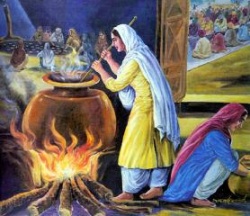Template:AOW268
Degh Tegh (Punjabi ਦੇਗ ਤੇਗ): This term forms part of the Sikh Ardas where it is recited in the line: "ਦੇਗ ਤੇਗ ਫਤਹ, ਬਿਰਦ ਕੀ ਪੈਜ, ਪੰਥ ਕੀ ਜੀਤ...." "Daeg taeg Fateh, bihrd kee paaej, Panth kee jeet....". The first phrase is "Daeg taeg Fateh"which means victory to "degh and tegh"; the second phrase is "bihrd kee paaej" or "protecting the honour or respect of the old or elderly" "and the third phrase is "Panth kee jeet" or "victory to the panth or 'followers of the righteous path'". In this article, we will just look at the first phrase: "Daeg taeg Fateh"
The word "degh" means "Large cooking pot" or "cauldron" or an "offering". The word "tegh" means "sword" or "kirpan". The term "degh tegh" refers to the concept of "degh" which is the serving of food to the community as in respect of the Langar; and "tegh" which is the protecting the liberty and rights of each member within the community.
The two concepts of making sure that everyone in the community is fed and does not go hungry; and also that no one's life in the community is in any danger and that all in society feel safe and protected are both concepts equally promoted by Sikhi and the Sikh Gurus. This combined concept has been promoted since the founder of Sikhism, the young Guru Nanak who when asked by his father to do a "sacch suhdah" or "true deed" gladly and lovingly spent the 20 rupees given to him by his father on feeding the holy sadhus (priests) in the vicinity rather than starting a business as expected by his father. .....More

